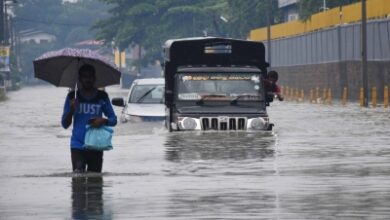Floods paralyse Philippine capital, many provinces
Manila, July 24 (IANS) Continuous rains triggered by Typhoon Gaemi and the southwest monsoon caused flooding that paralysed the Philippine capital Manila and many parts of the main Luzon Island on Wednesday.
The widespread flooding, knee-deep in some areas, forced the government to evacuate people near Manila Bay and rivers to safety, and close schools and offices. Local authorities also evacuated residents of coastal areas in the central and southern Philippine regions, Xinhua news agency reported.
Airport authorities said at least 16 flights were cancelled at the Ninoy Aquino International Airport on Wednesday morning.
Government offices and classes at all levels in the national capital region were suspended on Wednesday. The Philippine Senate and the House of Representatives also suspended their sessions.
The typhoon destroyed a colony of shanties near Manila Bay. Floods made many roads in the capital region impassable, stranding people who left their homes early to go to work. Radio reported that some cars stalled when trying to cross the flooded thoroughfare.
The government has yet to report deaths related to the flooding.
A radio reported that a 14-year-old boy had been missing after wading through a flood in Rizal province, east of Manila.
The Philippines’ state weather bureau PAGASA (Philippine Atmospheric, Geophysical and Astronomical Services Administration) said Gaemi intensified while moving northwestward over the Philippine Sea at 25 kilometres per hour, packing 155 km per hour winds and gusts up to 190 km per hour.
The bureau said Gaemi will continue to dump rain on Wednesday and “flooding and rain-induced landslides are possible.”
It added that the southwest monsoon enhanced by Gaemi will bring moderate to intense rainfall in many areas in Luzon until Friday, as well as areas in the Visayas region in the central Philippines and northern Mindanao in the southern Philippines.
Gaemi, the third typhoon to batter the Philippines this year, is expected to leave the Philippines by Wednesday night or early Thursday.
An average of 20 typhoons lashed the Philippines yearly.
The archipelago is prone to tropical cyclones which trigger heavy rains, flooding and strong winds, resulting in casualties and destruction of crops and properties.
–IANS
int/rs/svn




